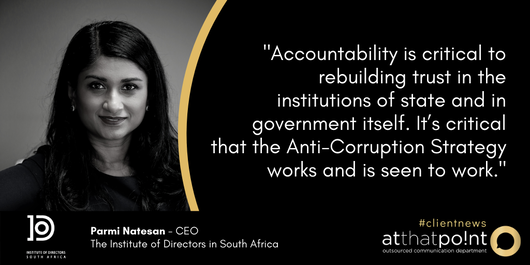|
In his recent State of the Nation Address, President Ramaphosa emphasised the deep negative impact of corruption on the country’s growth and development, with specific reference to the shocking revelations emerging from the Zondo Commission. The President noted that good progress had been made in rebuilding the law-enforcement bodies, and the implementation of a National Anti-Corruption Strategy.
“South Africans need no reminding that corruption is a cancer that is destroying the fabric of our society, and the recent scandals relating to the procurement of personal protective equipment have driven home how brazen the looting has become. But, at the same time, society is cynical about government’s political will truly to bring malefactors to book,” argues Parmi Natesan, CEO of the Institute of Directors in South Africa (IoDSA). “Accountability is critical to rebuilding trust in the institutions of state and in government itself. It’s critical that the Anti-Corruption Strategy works and is seen to work.” The IoDSA urges that government needs to consider the following in order to ensure its anti-corruption strategy actually works: Is it well designed? “It’s important the programme is aligned with legal requirements and stakeholder expectations—it must deliver accountability in line with what long-suffering citizens want,” she explains. “Equally important, the programme must focus on the key risks to ensure maximum impact, and its results must be rigorously measured and reported. Transparency is the twin sister of ethics and accountability.” Is it being applied in good faith? With the greatest respect, it is easy to set up initiatives but only few actually deliver. Adequate resourcing and a record of swift action taken against corrupt individuals indicate good faith. It must also be clear that initiatives are in place to make ethical behaviour the default setting across government. These would include a visible commitment to ethical behaviour at the highest echelons of government, comprehensive training throughout the organisation and a well-communicated anti-corruption policy. In a sense, government is the board of South Africa Inc, and so is responsible for setting the “tone at the top” and driving it down throughout the country. Does it work? Any programme is only so good as its results. Government must commit to actively monitoring how well its anti-corruption programme is working based on a consistent set of metrics, one of which should be the incidence of corruption both in terms of value and number of incidents. “Government needs to ensure not only that that monitoring takes place, but that it reviews the results regularly to identify and remediate any gaps,” Ms Natesan notes. It’s worth reminding ourselves of how serious the consequences of corruption and unethical practices are. They include lack of societal service delivery, and reputational damage to the country and the government, as well as their leaders. From a governance perspective, corruption is essentially the opposite of good corporate governance i.e. ethical and effective leadership. “A corrupt country will find it hard to attract foreign direct investment, inhibiting the growth of a tax base government can use to fund social-upliftment projects. Civil claims by parties who suffered loss as a result of corruption are also a possibility,” Ms Natesan concludes. “Of course, individuals convicted of corruption could face criminal charges as well.” ENDS MEDIA CONTACT: Stephné du Toit, 084 587 9933, [email protected], www.atthatpoint.co.za For more information on the IoDSA please visit: Website: www.iodsa.co.za Twitter: @The_IoDSA LinkedIn: Institute of Directors in South Africa Company Page
0 Comments
Leave a Reply. |
Archives
July 2024
Categories
All
|


 RSS Feed
RSS Feed